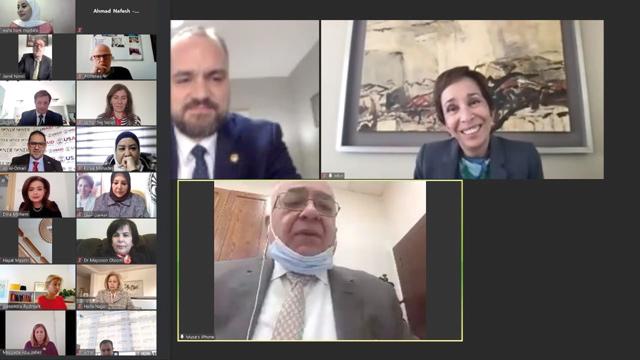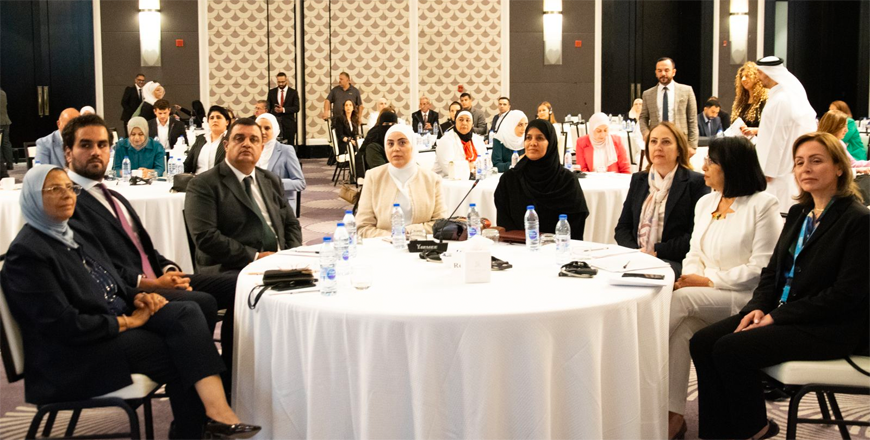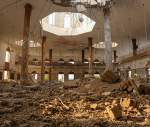You are here
Guide launched to help narrow gap in women’s political participation
By Rana Husseini - Dec 08,2020 - Last updated at Dec 08,2020

HRH Princess Basma takes part in the launch of the 'Guide on Combating Violence against Women in Public Life', held via videoconference, on Tuesday (Photo courtesy of the NDI)
AMMAN — HRH Princess Basma on Tuesday said that fear of political violence is one of the biggest factors that often discourages women from achieving political representation.
“Although this varies in form and degree from country to country and between regions, women are often hesitant about going into the political arena or seeking leadership positions, because of the possibility or even the experience of violence,” Princess Basma said.
Princess Basma’s remarks were made during the launch of the “Guide on Combating Violence against Women in Public Life” and “the National Advisory Team to Combat Violence against Women in Politics,” in an online event.
The initiative was undertaken by the National Democratic Institute (NDI) in collaboration with Coalition of Women MPs from Arab Countries to Combat Violence against Women and the Westminster Foundation for Democracy and supported by USAID.
While a general view exists that this is part of the cost women must pay for their political participation, this is not the case, Princess Basma, who acted as patron to the event, stressed.
In fact, the princess added, the real cost of political violence against women is the absence of women from the scene.
With this in mind, Princess Basma continued: “I am certain that many women already in, or about to enter political and public spaces in the Arab world, including Jordan, will benefit from the guide, which aims to help narrow the gap in women’s political participation”.
“The Guide also identifies protective and preventative measures open to women in order to counter violence,” Princess Basma added.
President of the Coalition of Women MPs from the Arab Countries to Combat Violence against Women Wafa Bani Mustafa said that the increase of number of women’s taking part in political life has subjected them to more violence in the real and virtual world.
Bani Mustafa pointed out that 60.4 per cent of Jordanian female politicians were subjected to cyber bullying.
Meanwhile, NDI Senior Country Director and Global Associate Arianit Shehu pointed out that Jordan is taking a leading role in the world in promoting the message of combating violence against women through this launch of the “Guide on Combating Violence against Women in Public Life”.
“While, fortunately, women empowerment and gender equality have become important and instrumental to democracy development worldwide, much, much more needs to be done,” Shehu said.
NDI reports and other international organisation reports, unfortunately, point out that many politically active women still witness harassment, threats, psychological abuse, physical and sexual assault, be it in person or online, according to Shehu.
The research in 2018 by the Inter-Parliamentary Union and the NDI found that 46 per cent of politically active women worldwide had received death threats or threats of being raped or beaten, Shehu added.
Two-thirds of politically active women had been a target of public comments related to their physical appearance or based on other gender stereotypes, according to the NDI official.
Also addressing the gathering was Ambassador Maria Hadjitheodosiou, the head of the European Union Delegation to Jordan, who stressed that women in politics worldwide are increasingly becoming a target of diverse forms of violence.
“Violence against politically active women make it more difficult to build the kind of sustainable and resilient democracies we all wish for, and that would benefit from politics built on inclusion and equality,” Hadjitheodosiou told the gathering.
Regrettably, the EU official added, this violence cuts across all political sectors, and targets women — both physically and online — regardless of their political role, age, background or status.
“It is very encouraging for me to witness that this guide is prepared on the issue of combating violence against women in public life,” Hadjitheodosiou stressed. Jordan, has and continues to be, a leader in the region by addressing this concerning issue, Hadjitheodosiou added.
She also reiterated the EU’s commitment to support the participation of women in public life in Jordan and the enhancing of a conducive environment.
Also addressing the gathering was Minister of Political and Parliamentary Affairs Musa Maaytah who affirmed the Kingdom’s commitment to combating violence against women in all fields.
“Women’s political participation is part of the Kingdom’s agenda throughout history and a decision from the top officials in the country,” Maaytah said.
Speaking at the event, USAID Mission Director Sherry F. Carlin said: "The United States and Jordan have been strategic partners for 70 years and we’re committed to supporting Jordan’s economic growth and security. We share the belief that women’s empowerment and political participation make Jordan stronger. USAID supported the development of the Guide on Combating Violence against Women in Public Life to ensure that women’s voices are heard, and that women have the opportunity to participate in politics, the economy and public life."
“The government also realises that combating gender-based violence will reflect positively on the “development wheel, which would contribute to building a solid society where both men and women take part in the decision-making process,” Maaytah noted.
Related Articles
AMMAN — Minister of Social Development Wafa Bani Mustafa said on Monday that the upcoming parliamentary elections will witness an increase i
AMMAN — Government officials, political activists and parliamentarians met on Saturday to discuss the 2016 Elections Law and find ways to am
AMMAN — Politicians and activists on Sunday said efforts should centre on minimising the effects of political violence against women to ensu

















